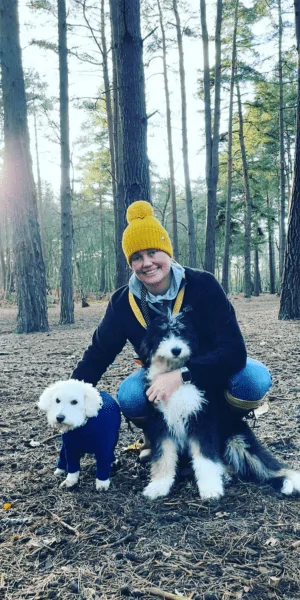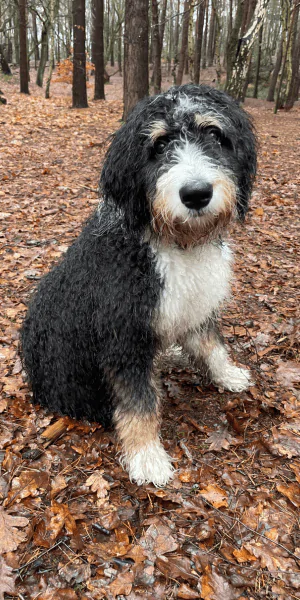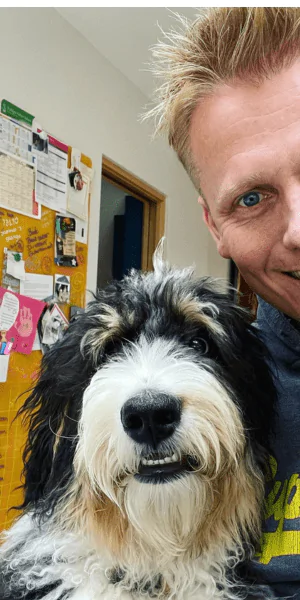
A vet’s guide to your puppy’s first 6 months of development

Dr Scott Miller
27 April 2023 | 10 minutes read
Becoming a puppy parent is both an exciting and challenging time. To help you prepare for the journey, expert vet Dr Scott Miller guides you through the first 6 months of puppyhood.
With examples from his own dog Ludo, find out what to expect at each development stage, from sleep to training and socialising.
- The puppy blues
- 8 week puppy stage
- 2-3 month puppy stage
- 3-4 month puppy stage
- 4-5 month puppy stage
- 6 month puppy stage
The puppy blues
First things first, let’s talk about something that affects many pet parents – the puppy blues.
It’s very common to have moments of feeling overwhelmed and thinking you’ve made a bad decision in getting your puppy.
But it doesn’t mean you don’t love your new pet pal. In fact, it’s completely normal, and many other people feel exactly the same in those early days of puppy parenting:
- You change as a person when you get a puppy. You suddenly have something that’s completely reliant on you.
- You’ll have to make big changes in your life and routine, such as not going out as much or not seeing friends as often.
The most important thing is to be open and talk about your feelings instead of bottling things up. Get guidance and support from other dog owner friends.

8 week puppy stage
Many puppies head off to their new home at eight weeks old and it’s common for them to feel unsettled. After all, they’re leaving behind their mum, siblings, and all the familiar sights and smells of their old home.
The big thing is not to change too many things for your puppy in those first few weeks.
Double-check that you have everything you need for your new arrival in this new puppy checklist.
Feeding
Switching straight over to a new food can cause your puppy to have an upset stomach.
- Stick to the food given by the breeder or rescue centre for a few weeks.
- You can then start looking into diets that are suited to your pup’s physical needs and slowly transition them over.
Sleeping
As we’ve mentioned, your puppy has gone from being surrounded by their litter mates to being alone. So it’s natural for them to be upset and anxious at night.
- A crate is a great sleeping area for puppies as it acts as a safe, calm, and quiet den to escape to and snooze in when needed.
- Having a second dog sleeping with or near your puppy can also help with potential night time separation anxiety.
- Our older dog Skully slept downstairs with our puppy Ludo and that helped to keep her company. She stopped making noises after a few days.
Basic toilet training
Puppies have a fast metabolism and need to go to the toilet regularly. All of the times they’re waking up in the night is because they need that release. They may also be anxious because they can’t go to the toilet in the right place.
- Waking up in advance and taking them out into the garden for the toilet is key to getting them to happily sleep through.
- This means rather than waking up to them crying, you get up proactively and allow them to go toilet. You then pop them back in their bed once they’re calm.
- If it’s a colder time of year, you can put them on a puppy pad rather than take them out into the garden.
Starting your puppy’s toilet training early and using positive reinforcement techniques is a great way to help build your bond.

2-3 month puppy stage
Around the two to three month stage, your puppy is starting to settle into their new surroundings. Continue to bond with your puppy and start to build their confidence with the outside world.
Bonding with the family
Praise is a really important way to bond with puppies, particularly when trying to encourage relationships with kids in the house.
- It’s important to burn off your puppy’s physical and mental energy so they’re calmer and more relaxed around children.
- Try keeping your puppy engaged with toys, interactive games, and other forms of dog enrichment.
- It’s absolutely fine for the kids to play with the new four-legged family member. Just be mindful of burning some excess puppy energy beforehand if you have children with extra needs.
Vaccinations
A puppy’s first set of primary course vaccinations is given from six to eight weeks old, with the second set following around 2 – 4 weeks later.
- As a vet, I always use diversion when vaccinating puppies.
- Puppies generally love food, so bring in your puppy’s favourite treat.
- The treat is offered just as the injection is about to go in to help keep your puppy still.
For more info on what injections are given and when it’s safe to take your pup outside, check out this guide on puppy vaccinations.
Socialisation
Now’s a good time to start socialising your puppy with new people. How you introduce them to friends and family depends on their individual personality.
- Don’t force things if your puppy is a bit shy – let them go at their own pace.
- Gently remind people your puppy is a dog and not a plaything. This is especially important with kids who can be handsy and pull dogs around.
- Rather than people rushing up to your puppy, allow your puppy to come to them and let them investigate in their own time.
Introducing common sights and sounds of daily life
Your puppy’s world is opening up beyond the familiarity of the house and garden.
- In the early stages of life, your puppy can be prone to fear and then remain fearful. Keep in mind that you’ve got a four-legged toddler with an incredible sense of hearing and smell.
- Take things slowly when it comes to exposing them to new sights and sounds, introducing them as and when it’s needed.
- Give your puppy distance from the things you’re introducing them to so they can choose to stay away or get closer.
- For example, Ludo isn’t a big fan of the vacuum. After all, it’s a noisy object that gives off high-frequency sounds and lunges towards your dog. You want them to be comfortable around these things and know they can take themselves away if needed.
- You’re just looking for a neutral reaction to things rather than a negative one – they don’t have to love everything.
Find out more about how to build your dog’s confidence in public and set them up for success when out and about.
Exploring with their mouths
Puppies are like toddlers and explore the world with their mouths, especially during those earlier months when everything is new and exciting. Ludo loves stealing shoes and taking them off into the garden!
- Be mindful of potential hazards that could be within their reach.
- Offer your puppy things designed to help with their chewing behaviour, like tough chew toys and Kongs.
- Help them understand what are their chew things and what items are yours (and so not for chewing).
- Be careful not to leave them alone with any toys that could be a choking or swallowing hazard.
Most importantly, encouraging your puppy to trust you and show you what’s in their mouth can help prevent resource guarding.

3-4 month puppy stage
At the three to four months stage, your puppy is getting more familiar and confident with the world around them. It’s time to start ramping up their basic training and teaching them good manners.
Basic training
- Luckily Ludo (like many pups) is food motivated, so this was used as a reward when training her – you could also use toys if these are high value for your pup.
- Focus on teaching your puppy the essentials like the ‘leave it’ cue.
- How receptive they are to training depends on the breed (some can be more headstrong than others).
- Being a responsible pet parent is looking into the breed before you commit to see which suits you best – and avoids a shock if they’re tricky to train.
Take a look at the first three things a dog behaviourist recommends teaching your puppy (and how to do it using positive reinforcement).
Walking
You’ll need to be careful when walking your puppy so you don’t over-exercise them and affect their growth.
- A good rule of thumb is to walk them 5 minutes per month of age.
- Remember, it’s more about social interaction and playtime at this age than miles – you want to keep them stimulated.
- Focus on teaching your puppy to walk nicely on a lead, starting in the garden.
Jumping up
Being excitable little balls of energy, your puppy may be jumping up at family members and visitors. Ludo does this out of affection but it can be a tad forceful because she’s a bigger breed (Bernedoodle).
- Start teaching your puppy ‘paw on the floor’ and reward the behaviour.
- You need to be confident enough to also train other people not to encourage your puppy’s jumping up.
- Ask visitors to turn around and ignore your puppy while you’re getting them to ‘paw on the floor’.
Vocalising
It’s not just your puppy’s confidence that’s growing now – they’re also starting to find their voice.
- Remember, it’s totally natural for your pup to bark, and unrealistic to expect them never to be vocal.
- Your dog uses vocalisation to communicate with you, including alerting you to things around them.
- You can introduce your dog to other ways of communicating with you if you think they’re starting to bark excessively.
Sleeping progress
- At this point, your pup will be sleeping around six to seven hours a night.
- They should be able to hold their bladder for longer and so not need letting out for night time toilet breaks.
- Check that they still fit comfortably in their crate. This should be fine if you invested in one that was around twice the size that your puppy needed.
Teething and mouthing manners
Chewing may start to ramp up as your puppy hits their teething stride.
- Remember that chewing is a natural behaviour for teething and to generally help your pup explore their surroundings. But you still need to teach your puppy mouthing manners.
- A common mistake of many dog parents is overusing their hands during play, which can encourage puppies to see hands as playthings. Be wary of this, especially if you have children with additional needs.

4-5 month puppy stage
At four to five months old, your puppy is changing over to their adult coat.
- It’s important to get them comfortable with grooming if they’re long-haired or a shedding breed.
- Don’t go from not doing any grooming straight to full clipping (at home or with a professional groomer) as this will be overwhelming for your pup.
- Expose them to grooming little and often as a way to help them feel comfortable and realise it’s part of everyday life.
Check out these top tips on how to introduce your dog to grooming at home.

6 month puppy stage
At the six month stage, puppy parents may start discussing with their vet about neutering and what options are available.
- The timing is usually dependent on the breed as they will each grow to full size and maturity at different times..
- The first season tells you when your pup is reaching maturity. But it can be harder to tell when the season will be with mixed-breed dogs like Ludo.
- There’s lots of schools of thought around neutering. Have open and honest conversations with your vet/dog behaviourist to see what works for your puppy
- As a vet, I’ve seen issues with dogs who have been neutered before their first season, so I wait until afterwards.
Find out more about how the timing of your female dog’s spaying can affect their future behaviour from an expert dog behaviourist.
Cover your four-legged friend throughout their early adventures with flexible puppy insurance from Petsure.


